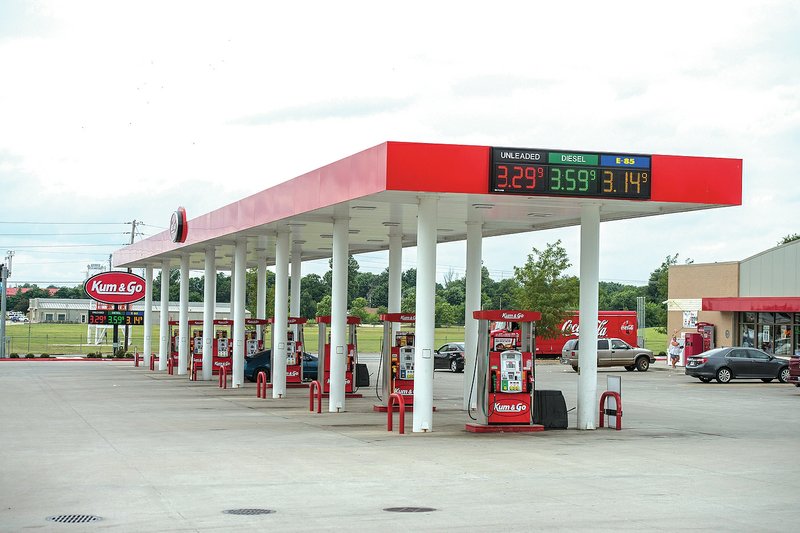SPRINGDALE -- It's been 3 1/2 years since Benton County Judge Bob Clinard's discussions about converting county vehicles to an alternative fuel source -- compressed natural gas.
Vehicle costs and the lack of fuel providers helped derail his proposal.
By The Numbers
Natural Gas Vehicles
142,000: Natural gas vehicle on U.S. roads.
15.2 million: Natural gas vehicles worldwide.
1,325: Natural gas fueling stations in the U.S.
50: Number of manufacturers that produce 100 models of light, medium and heavy duty natural gas vehicles and engines.
$1.50 to $2: Savings per gallon after switching from gasoline to natural gas.
50 percent: Trash trucks purchased in 2012 that are powered by natural gas.
Source: ngvc.org
At A Glance (w/logo)
Compressed Natural Gas Availability
CNG is available in these Arkansas cities:
• Jonesboro
• Damascus
• North Little Rock
• Little Rock
• Conway
• Fort Smith
Source: Staff Report
Within a few months, however, two Springdale gas stations will offer compressed natural gas, removing one of the stumbling blocks to using the fuel.
The availability of compressed natural gas could attract businesses to the area and help businesses save money. It's also better for the environment than gasoline, according to officials.
Two Kum & Go stations will be the first to offer the fuel in Northwest Arkansas. The stations are near Interstate 49 and Elm Springs Road, and on Robinson Avenue near the Springdale Municipal Airport.
Offering the fuel will allow Kum & Go to reach customers it wouldn't otherwise be able to, said Traci Rodemeyer, manager of external communications for the company. She said it's about demand, and offering the public the fuel they want to use.
Company officials want Kum & Go to be a leader in their industry by providing environmentally sustainable fuels, Rodemeyer said. They will continue to explore alternative fuel choices, like compressed natural gas, she said.
Compressed natural gas is the most commonly used natural gas in the United States, said Richard Kolodziej, president of Natural Gas Vehicles America, an association for the natural gas vehicle industry.
The Springdale Water and Sewer Commission approved the purchase of two compressed natural gas vehicles at Wednesday's meeting. They discussed the two Kum & Go stations and the money they could save. One of the vehicles will cost $33,834, while the other will cost $32,340.
Initial costs for compressed natural gas vehicles are higher than those that use gasoline, Kolodziej acknowledged. A small vehicle, like a Honda Civic, could cost $5,000 to $6,000 more while a bus could cost about $40,000 more.
The price of compressed natural gas varies, but can be $1.50 to $2 per gallon less than gasoline.
The savings happens over time, Kolodziej said. Companies that have high fuel-use commercial vehicles would have the largest savings.
"It's all about payback," he said. "It's not about the first cost."
There is an additional economic impact in Arkansas: it is one of the places compressed natural gas is produced, said Rich Davis, manager of community and government affairs for SourceGas. It helps the national economy, because it reduces the amount of oil needed from overseas, Kolodziej said.
"It percolates throughout the economy," he said.
Using compressed natural gas is also better for the environment than gasoline, Kolodziej said. The fuel is made of methane and emits carbon dioxide when burned.
Both chemicals are greenhouse gases that can cause the atmosphere to trap more heat from the sun. Kolodziej explained that estimates vary, but the entire process for compressed natural gas, from production to use, emits about 20 percent less greenhouse gases than gasoline.
Joel Gardner, executive director of Ozark Regional Transit, said none of the organization's buses use compressed natural gas. He wants to use the fuel, but there are challenges to overcome, primarily training staff members to work on vehicles which use compressed natural gas.
Vehicles using compressed natural gas aren't very different than their gasoline counterparts, Kolodziej said. Most of the differences are in the way the fuel is stored within the vehicle.
Gardner said he thinks the organization might have some compressed natural gas vehicles in a couple years. The cheaper fuel could help keep transit prices low for the public.
The existence of stations in Springdale will not likely change minds on the Benton Count Quroum Court, however.
Quorum Court officials discussed that the only way to get compressed natural gas in Benton County would be if a company decided to build a station or an existing station decided to provide the fuel, Clinard said. The county won't be able to convert its vehicles until that happens. They won't go to Springdale for fuel.
"We need something close," he said.
Clinard said he understands converting to compressed natural gas would be an investment. The Quorum Court ultimately gets to make the decision of whether or not to spend money.
"It's the best way to go," he said. "If I could just snap my fingers and blink my eyes, we would convert everything to CNG."
NW News on 07/21/2014
